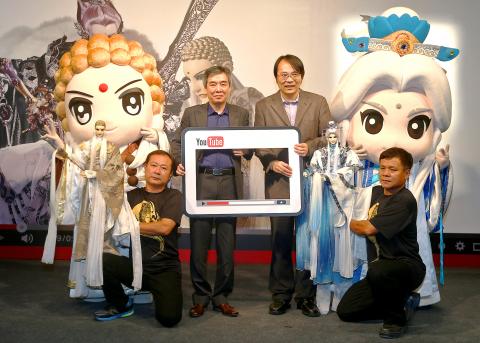Pili International Multimedia has teamed up with YouTube to air its Taiwanese puppet shows on the Web site in an effort to promote the traditional art among overseas viewers.
Starting this week on Wednesday, YouTube viewers can see eight series of puppet shows from Pili Multimedia, company chairman Vincent Huang (黃強華) said.
The shows are to be presented in Taiwanese with English subtitles, he said. The content currently is free, but Pili Multimedia said it might soon introduce a fee.

Photo: CNA
Huang said he hoped viewers around the world would be able to learn more about the culture of budaixi (布袋戲), or Taiwanese traditional puppet theater, through the YouTube clips.
Meanwhile, Google Taiwan managing director Chien Lee-feng (簡立峰) said YouTube is pleased to work with Pili to promote the art abroad. Chien recalled skipping classes when he was a child to watch budaixi.
Hand or cloth puppet shows were first introduced to Taiwan in the Qing Dynasty, and new cultural elements and creative performing styles were adapted to create the popular puppet shows seen today.
Pili International Multimedia evolved in 2000 from a puppet show company that was established in 1992 by Chris and Vincent Huang, members of the nation’s most prominent puppet family.
Their grandfather, Huang Hai-tai (黃海岱), father Huang Chun-hsiung (黃俊雄) and other family members maintained the tradition of finding new ways to advance the art of wooden puppet performances.
The younger Huangs have adopted Hollywood production techniques, as well as computer animated special effects and digital sound effects, to take the traditional art form to a new level since the release of Pili Multimedia’s first puppet film in 2000, Legend of the Sacred Stone (聖石傳說).

The High Prosecutors’ Office yesterday withdrew an appeal against the acquittal of a former bank manager 22 years after his death, marking Taiwan’s first instance of prosecutors rendering posthumous justice to a wrongfully convicted defendant. Chu Ching-en (諸慶恩) — formerly a manager at the Taipei branch of BNP Paribas — was in 1999 accused by Weng Mao-chung (翁茂鍾), then-president of Chia Her Industrial Co, of forging a request for a fixed deposit of US$10 million by I-Hwa Industrial Co, a subsidiary of Chia Her, which was used as collateral. Chu was ruled not guilty in the first trial, but was found guilty

DEADLOCK: As the commission is unable to forum a quorum to review license renewal applications, the channel operators are not at fault and can air past their license date The National Communications Commission (NCC) yesterday said that the Public Television Service (PTS) and 36 other television and radio broadcasters could continue airing, despite the commission’s inability to meet a quorum to review their license renewal applications. The licenses of PTS and the other channels are set to expire between this month and June. The National Communications Commission Organization Act (國家通訊傳播委員會組織法) stipulates that the commission must meet the mandated quorum of four to hold a valid meeting. The seven-member commission currently has only three commissioners. “We have informed the channel operators of the progress we have made in reviewing their license renewal applications, and

Taiwan People’s Party (TPP) Chairman Huang Kuo-chang (黃國昌) yesterday appealed to the authorities to release former Taipei mayor Ko Wen-je (柯文哲) from pretrial detention amid conflicting reports about his health. The TPP at a news conference on Thursday said that Ko should be released to a hospital for treatment, adding that he has blood in his urine and had spells of pain and nausea followed by vomiting over the past three months. Hsieh Yen-yau (謝炎堯), a retired professor of internal medicine and Ko’s former teacher, said that Ko’s symptoms aligned with gallstones, kidney inflammation and potentially dangerous heart conditions. Ko, charged with

Taiwan-based publisher Li Yanhe (李延賀) has been sentenced to three years in prison, fined 50,000 yuan (US$6,890) in personal assets and deprived political rights for one year for “inciting secession” in China, China's Taiwan Affairs Office spokesman Chen Binhua (陳斌華) said today. The Shanghai First Intermediate People’s Court announced the verdict on Feb. 17, Chen said. The trial was conducted lawfully, and in an open and fair manner, he said, adding that the verdict has since come into legal effect. The defendant reportedly admitted guilt and would appeal within the statutory appeal period, he said, adding that the defendant and his family have